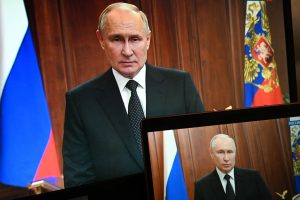Russia said on Sunday that China threw its support behind President Vladimir Putin’s efforts to stabilize the country after an aborted rebellion against the Kremlin by an army of mercenaries.
The Russian Foreign Ministry said China declared support for the leadership in Moscow during a previously unannounced trip to Beijing by Russian Deputy Foreign Minister Andrei Rudenko.
“The Chinese side expressed support for the efforts of the leadership of the Russian Federation to stabilize the situation in the country in connection with the events of June 24, and reaffirmed its interest in strengthening the unity and further prosperity of Russia,” the Russian statement said.
Rudenko met with Chinese Foreign Minister Qin Gang to discuss “international and regional issues of common concern,” the Chinese Foreign Ministry said on its website.
Rudenko’s visit came just a day after Yevgeny Prigozhin, head of the private mercenary army Wagner Group, ordered his troops to march on Moscow in the greatest challenge to Putin’s more than two decades in power. Prigozhin later on Saturday reached a deal with the Kremlin to go into exile.
It was unclear whether Rudenko’s visit to China was in response to the rebellion.
The Chinese Foreign Ministry said in a statement late Sunday that the uprising was “Russia’s internal affair.”
“As a friendly neighbor and comprehensive strategic partner in the new era, China supports Russia in maintaining national stability and achieving development and prosperity,” it said, without explicitly referencing Russia’s leadership.
China and Russia, while not formal allies, have maintained close ties throughout Moscow’s invasion of Ukraine, which China has refused to condemn.
The United States and other Western powers have urged Beijing not to supply Russia with arms that could be used in the Ukraine conflict. China in May sent an envoy to Ukraine and Russia in an attempt to mediate talks to end the war.
While in Beijing, Rudenko also held talks with Chinese Vice Foreign Minister Ma Zhaoxu. The two sides pledged to “strengthen solidarity and cooperation” and promote the Shanghai Cooperation Organization, a security-focused regional group that both Russia and China belong to, according to a readout of the talks by the Chinese Foreign Ministry.
“Under the complex and severe international situation, it is necessary to … communicate in a timely manner, ensure the stable and long-term relationship between the two countries and safeguard the common interests of both sides,” Ma said.
Although short-lived, analysts say the Wagner Group revolt exposed further weaknesses of Putin, whose image has already been badly bruised by the Ukraine war, which has dragged on for 16 months and claimed huge numbers of Russian troops.

































